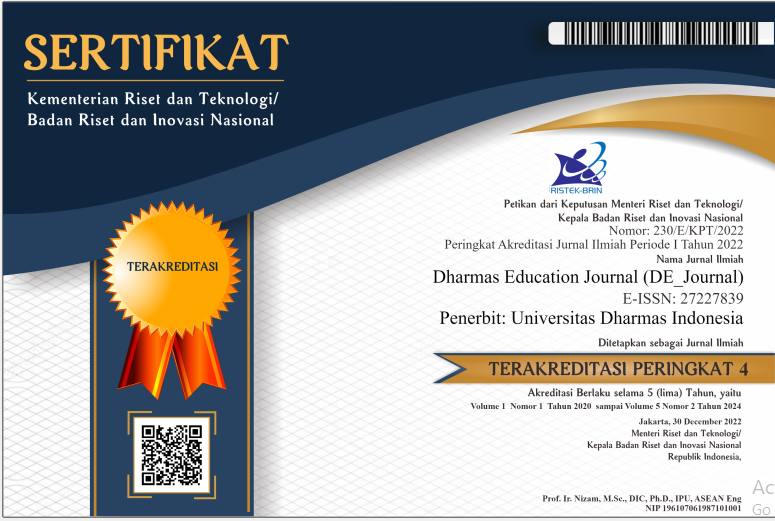Analisis Bibliometrik : Tren Penelitian Asesmen Computer Based Test Pada Tahun 2015-2025
DOI:
https://doi.org/10.56667/de_journal.v6i1.1805Keywords:
Computer-Based Test Assessment, Bibliometrics, Research TrendsAbstract
The aims of this research is to find out and review the research trends of computer-based test assessment in education science over the past 10 years. The research method used is a literature study using bibliometric analysis method. Bibliometric analysis is a quantitative method used to measure and analyze scientific publications, such as journal articles, books, or conference proceedings and metadata processing. As for the metadata used in this research was sourced from Google Scholar. Database search and analysis used Publish or Perish (PoP) and VOSviewer software. The results showed that there was trends in research on increasing interest in adaptive question development, integration of CBT with LMS, and the effect of CBT on student learning outcomes. This research can be used as a reference for further research on variables that have not shown correlation through Vosviewer. Some recommendations related to this research include the importance of expanding the use of database sources to collect published articles, for example through the WOS (Web of Science) database. The implication of this research is the availability of literature as preliminary analysis results to be used in further research
Downloads
References
Ambiyar, M. P., & Panyahuti, M. S. (2020). Asesmen Pembelajaran Berbasis Komputer dan Android. Prenada Media.
Barrett, S. H. (2023). Assessment by design: A practical approach to improve student learning. Routledge, Taylor & Francis Group. https://doi.org/10.4324/9781003443094
Bello, H., & Abdullah, N. A. (2021). Investigating the Influence of Quality Factors on User Satisfaction with Summative Computer-based Assessment. Electronic Journal of E-Learning, 19(6), pp490-503. https://doi.org/10.34190/ejel.19.6.2487
Cahyaningsih, E., Shaleh, S., & Fitriyanti, A. (2024). Utilization of Computer-Based Testing Technology to Optimize Cognitive-Based Assessment Literacy in the Learning of Islamic Elementary School Students. Journal of Integrated Elementary Education, 4(2), 151–172. https://doi.org/10.21580/jieed.v4i2.21943
Csapó, B., Ainley, J., Bennett, R. E., Latour, T., & Law, N. (2012). Technological Issues for Computer-Based Assessment. In P. Griffin, B. McGaw, & E. Care (Eds.), Assessment and Teaching of 21st Century Skills (pp. 143–230). Springer Netherlands. https://doi.org/10.1007/978-94-007-2324-5_4
Dann, P. L. (Ed.). (1991). Advances in computer-based human assessment. Kluwer.
H., N., Gani, H. A., Pratama, Muh. P., & Wijaya, H. (2021). Development of an Android-based Computer Based Test (CBT) In Middle School. Journal of Education Technology, 5(2). https://doi.org/10.23887/jet.v5i2.33527
Gronlund, N.E., & Linn, R.L., 1990. Measurement and Evaluation in Teaching. New York: Macmillan Publishing Company.
Hasmawati, H., & Muktamar, A. (2023). Asesmen dalam Kurikulum Merdeka Perspektif Pendidikan Agama Islam. Indonesian Journal of Innovation Multidisipliner Research, 1(3), 197–211. https://doi.org/10.31004/ijim.v1i3.20
Hooda, M., Rana, C., Dahiya, O., Rizwan, A., & Hossain, M. S. (2022). Artificial Intelligence for Assessment and Feedback to Enhance Student Success in Higher Education. Mathematical Problems in Engineering, 2022, 1–19. https://doi.org/10.1155/2022/5215722
Istiyono, E., Dwandaru, W. S. B., Asysyifa, D. S., & Viana, R. V. (2020). Development of computer-based test in critical thinking skill assessment of physics. Journal of Physics: Conference Series, 1440(1), 012062. https://doi.org/10.1088/1742-6596/1440/1/012062
Khoshsima, H., Hosseini, M., & Toroujeni, S. M. H. (2017). Cross-Mode Comparability of Computer-Based Testing (CBT) Versus Paper-Pencil Based Testing (PPT): An Investigation of Testing Administration Mode among Iranian Intermediate EFL Learners. English Language Teaching, 10(2), 23. https://doi.org/10.5539/elt.v10n2p23
Makmun, S., Aliyah, N., Nafisah, P., & Thahir, T. (2024). CBT (Computer Based Test) sebagai Alat Evaluasi terhadap Pembelajaran Matematika ( Studi Kasus di Madrasah Aliyah Sumenep). Fakta: Jurnal Pendidikan Agama Islam, 4(1), 47. https://doi.org/10.28944/fakta.v4i1.351
Miller, M. D., Linn, R. L., & Gronlund, N. E. (2012). Measurement and assessment in teaching. New Jersey: Pearson Higher Education.
Ramdhan, M. 2021. Metode penelitian. Jakarta : Cipta Media Nusantara
Siregar, T., Armanto, D., Frisnoiry, S., & Elfitra, E. (2024). Revolutionizing Assesment Techniques in Economics Education: Android-Based CBT Assessment System as an Innovative Approach for Evaluating Students‘ Learning in Economics. Proceedings of the 5th International Conference on Innovation in Education, Science, and Culture, ICIESC 2023, 24 October 2023, Medan, Indonesia.
Stefan, P., Pfandler, M., Kullmann, A., Eck, U., Koch, A., Mehren, C., Von Der Heide, A., Weidert, S., Fürmetz, J., Euler, E., Lazarovici, M., Navab, N., & Weigl, M. (2023). Computer-assisted simulated workplace-based assessment in surgery: Application of the universal framework of intraoperative performance within a mixed-reality simulation. BMJ Surgery, Interventions, & Health Technologies, 5(1), e000135. https://doi.org/10.1136/bmjsit-2022-000135
Sudakova, N. E., Savina, T. N., Masalimova, A. R., Mikhaylovsky, M. N., Karandeeva, L. G., & Zhdanov, S. P. (2022). Online Formative Assessment in Higher Education: Bibliometric Analysis. Education Sciences, 12(3), 209. https://doi.org/10.3390/educsci12030209
Sun, W., Ding, Y., Wang, R., Liu, Y., Wang, Y., Zhu, B., & Liu, Q. (2024). Bibliometric analysis of assessment and evaluation in higher education: 2012–2023. Assessment & Evaluation in Higher Education, 49(8), 1121–1135. https://doi.org/10.1080/02602938.2024.2351602
Suyoso, S., Istiyono, E., & Subroto, S. (2017). Pengembangan Instrumen Asesmen Pengetahuan Fisika Berbasis Komputer Untuk Meningkatkan Kesiapan Peserta Didik Dalam Menghadapi Ujian Nasional Berbasis Komputer. Jurnal Pendidikan Matematika Dan Sains, 5(1). https://doi.org/10.21831/jpms.v5i1.12461
Wilson, J., Pollard, B., Aiken, J. M., Caballero, M. D., & Lewandowski, H. J. (2022). Classification of open-ended responses to a research-based assessment using natural language processing. Physical Review Physics Education Research, 18(1), 010141. https://doi.org/10.1103/PhysRevPhysEducRes.18.010141
Yu, W., & Iwashita, N. (2021). Comparison of test performance on paper-based testing (PBT) and computer-based testing (CBT) by English-majored undergraduate students in China. Language Testing in Asia, 11(1), 32. https://doi.org/10.1186/s40468-021-00147-0
Downloads
Published
How to Cite
Issue
Section
License
Copyright (c) 2025 Dharmas Education Journal (DE_Journal)

This work is licensed under a Creative Commons Attribution-NonCommercial-NoDerivatives 4.0 International License.
Makalah yang disampaikan diasumsikan tidak mengandung bahan propietary yang tidak dilindungi oleh hak paten















